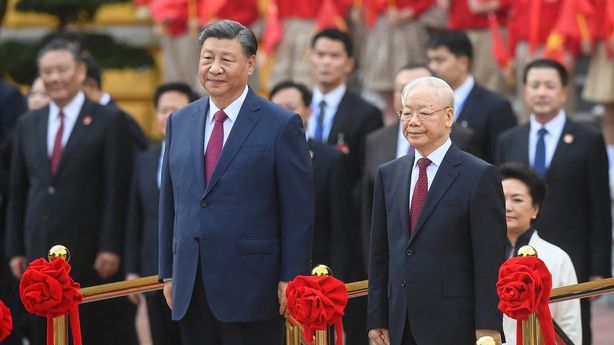Vietnamese leader Nguyen Phu Trong has died aged 80 "after a period of illness", the ruling Communist Party said.
The announcement came a day after the party, that Mr Trong led, said he would hand over power to focus on receiving medical treatment for an undisclosed medical condition.
State media announced Mr Trong had passed away in the afternoon at a military hospital "due to old age and serious illness".
"There will be a special statement on the organisation of the funeral at the national level," state media added.
Mr Trong's responsibilities have been handed to the country's largely ceremonial president, To Lam, a powerful former public security minister long seen as jockeying for the top job.
"The Politburo calls on the entire party, people and army to have absolute trust in the party's leadership and state management," it said.
The country's communist regime, which is in the midst of a complete overhaul, has undergone a series of upheavals in recent months, with ministers, business leaders and two presidents all falling from grace as part of a vast anti-corruption campaign.
Mr Lam was voted in as president in May by Vietnam's rubber-stamp parliament after his predecessor was forced to resign as part of the anti-graft drive.
Analysts said at the time that Mr Lam, who was deputy head of the steering committee on anti-corruption matters, had weaponised investigations to take down his political rivals.
Headed by the party general secretary, Vietnam's leadership structure gives the president the second-most authority, and also includes the prime minister and the head of the National Assembly.

Mr Trong's poor health had fuelled widespread speculation that he would not be able to stay in power until the 2026 party congress, which is expected to appoint a successor.
In office since 2011, Mr Trong enjoyed remarkable longevity in office, during a mandate that rights groups say has coincided with increasing authoritarianism.
Known for being a technocrat and on good terms with China, he structured the party around himself, benefiting from a decade of economic growth that strengthened his legitimacy.
The most powerful leader in decades
During Mr Trong's 13 years as general secretary of the Communist Party, thousands of people were arrested on corruption charges and a crackdown on dissidents and activists intensified in the one-party state.
Mr Trong was president from 2018 to 2021 and served three consecutive terms as general secretary, the first to do so since the "doi moi" era of economic reform began in 1986.
The unprecedented feat made him the most powerful leader in decades.
Mr Trong's high-profile anti-corruption drive, which analysts say was also linked to political in-fighting, swept through the party, police, armed forces and business.
More than 3,500 people have been indicted since 2021, official figures show, while those sent to prison include a former health minister and two previous mayors of Hanoi.
Following a scandal related to the Covid-19 pandemic last year, President Nguyen Xuan Phuc resigned and two deputy prime ministers were removed from their positions.
Many other prominent officials working across a wide range of sectors, from environment and energy to healthcare and banking, are under investigation.
Strengthening international relations
Mr Trong oversaw the strengthening of the country's relationship with several international powers during his terms in office.
In 2023, US President Joe Biden paid a brief visit to Vietnam where the two former enemies announced upgrading bilateral ties to the highest level.
Mr Trong visited the United States in 2015 and made three trips to China. Most recently, in December 2023, Chinese President Xi Jinping came to Hanoi, where the two pledged to deepen ties.
Vietnam has also become a crucial part of the supply chain for some of the world's most important companies over the past decade.

